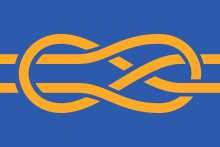|
Vexillology
 Vexillology (/ˌvɛksɪˈlɒlədʒi/ VEK-sih-LOL-ə-jee) is the study of the history, symbolism and usage of flags or, by extension, any interest in flags in general.[1] A person who studies flags is a vexillologist, one who designs flags is a vexillographer, and the art of designing flags is called vexillography. One who is a hobbyist or general admirer of flags is a vexillophile. EtymologyThe word vexillology is a synthesis of the Latin word vexillum (a kind of square flag which was carried by Roman cavalry)[2] and the Greek suffix -logia ("study").[3] HistoryAmerican scholar Whitney Smith is acknowledged for conceiving the term "vexillology" in 1957. He wrote "while the use of flags goes back to the earliest days of human civilization, the study of that usage in a serious fashion is so recent that the term for it did not appear in print until 1959."[4][5] Before this time, the study of flags was generally considered a part of heraldry, the study of armorial bearings.[6] Vexillology was formalized by American scholar Smith in 1961 with the publication of The Flag Bulletin.[7] During his lifetime, Smith organized various flag organizations and meetings including the first International Congress of Vexillology (ICV), the North American Vexillological Association, and the International Federation of Vexillological Associations (FIAV).[8] Involvement in vexillology includes academic work in fields such as sociology, history, or design. It also includes contributions from the flag industry and interest from those passionate about flags. The ICV and local vexillological meetings often cover a wide range of interests in flags. Since 1969, an International Congress of Vexillology meeting has been organized every two years under the auspices of FIAV; papers presented at an ICV are published afterwards as the Congress's Proceedings.[7] Vexillological organizationsThe International Federation of Vexillological Associations (FIAV) is vexillology's international umbrella organization. Notable constituent organizations include the North American Vexillological Association, Deutsche Gesellschaft für Flaggenkunde (English: 'German Society for Flag Studies'), and Flags of the World (FOTW).[9] All Scottish flags must, by law, be authorised by Lord Lyon for recording in the 'Public Register of All Arms and Bearings in Scotland' and he appointed Philip Tibbetts from the UK Flag Institute to the newly created role of Honorary Vexillologist to the Court of the Lord Lyon[10] in a rare example of a dedicated state mandated vexillologist. See also
References
Further reading
External linksWikimedia Commons has media related to Vexillology. |


